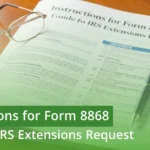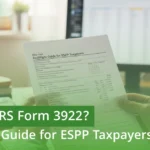
Understanding Form 1120: A Step-by-Step Guide for C Corporations
Form 1120 is the U.S. corporate income tax return form that C corporations use to report their income, gains, losses, deductions, and credits to the Internal Revenue Service. C corporations are distinct taxable entities, as they are required to file separately and pay tax on their earnings, regardless of their shareholders. This renders Form 1120 an important document for any business that is a C corporation. It is the cornerstone of tax reporting for these businesses, and any discrepancy or omission can result in penalties or undue audits. Whether you’re operating a small business or handling a big corporation, comprehending the details of Form 1120 is important to maintaining compliance with IRS requirements.
At ACCT Right PLLC, we have experience assisting companies in understanding the intricacies of tax compliance, and Form 1120 is one of the most important areas where our services can make a big impact. If you don’t know much about the form or are not sure how to file, you’ve come to the right place. In this guide, we’ll walk you through all you need to know about Form 1120, from who has to file it to the major sections that comprise the form itself. We’ll also demonstrate how our staff can help your company navigate the process so everything is filed properly, saving you time and money.
Who Needs to File Form 1120?
Form 1120 is actually for C corporations, which are corporations that are separate legal entities from their owners. They are taxed at corporate tax rates and file separately from their individual shareholders. If your company is a C corporation, you must file Form 1120 every year, even if it has no taxable income.
But if your company is organized differently, like an S corporation, partnership, or LLC, you might not have to file Form 1120. Instead, each of these types of companies has its own tax reporting form. For instance, S corporations report on Form 1120S, and LLCs with more than one member usually report on Form 1065. Knowing which form is used for your company structure is important for accurate tax reporting.
If you are not certain which tax form your business is subject to, or if you need assistance determining whether or not you should file Form 1120, our staff at ACCT Right PLLC can help. We provide consultations to assist you in determining the details of your tax filing requirements.
Important Elements of Form 1120
Form 1120 is very comprehensive, and care must be taken to fill out all sections correctly. The form has a number of parts, each of which is intended to gather certain information regarding the corporation’s financial transactions during the year.
1. Income Section:
Income in the Form 1120’s income section makes companies report total revenue. They report revenue coming from sales, interest, dividends, and any other source of revenue. The companies are also required to report any deductions connected to their revenue, including returns and allowances, to determine their gross income.
2. Deductions Section
This part enables businesses to claim allowable deductions, for example, cost of goods sold (COGS), wages, rent, and other business expenses. These reductions reduce the taxables income and end up decreasing the payable taxes. C corporations may also claim deductions of other expenses, for instance, insurance premiums, travel expenses for business, and interest on loans for business.
3. Taxable Income and Tax Computation:
After reporting all deductions and income, businesses determine their taxable income. The form will also lead you automatically in applying the correct tax rates according to your corporation’s income. Keep in mind that C corporations are taxed at corporate tax rates and may vary from the individual tax rates imposed on sole proprietorships or S corporations.
4. Tax Credits and Payments:
Form 1120 also provides space to report any tax credits available, i.e., research and development credit, foreign taxes, or retirement plan contribution credits. These are deductible from total tax liability. Businesses also have to report amounts of estimated taxes paid during the year or prepaid taxes to allow for proper records.
5. Shareholder Information:
While Form 1120 is for C corporations, it also asks for information regarding the shareholders of the corporation, including the number of shares owned and whether dividends were paid. This information assists the IRS in ensuring that all distributions of income are accounted for.
Filing Deadlines and Penalties for Late Filing
The IRS provides strict deadlines for filing Form 1120. C corporations typically need to file Form 1120 by the 15th day of the fourth month following the close of their tax year. For calendar-year corporations, the deadline is generally April 15th. In the event this date is a weekend or holiday, the deadline is moved to the following business day.
It should be mentioned that the non-filing of Form 1120 within the deadline period can lead to huge penalties. The IRS imposes a penalty of $210 for each month (or portion of a month) the return is late up to 12 months. Also, if the corporation has tax due and does not pay by the deadline, interest will be charged on the balance due, making the amount payable even higher.
How ACCT Right PLLC Can Assist
Completing Form 1120 may be a convoluted and time-consuming procedure. At ACCT Right PLLC, we recognize that it can be intimidating for most business owners to deal with the subtleties of corporate tax law. That is why we are here to take the complexity out of the procedure. Our expert accountants can assist in ensuring that Form 1120 is completed correctly and filed within the deadline.
Besides tax preparation services, we also provide strategic tax planning to reduce your corporation’s tax liability and enhance financial effectiveness. With our help, you can concentrate on business expansion, knowing that your tax filing obligations are in skilled hands.
Conclusion
Form 1120 is an important form for C corporations, where companies ensure they are in agreement with federal tax regulations and remit the right amount of tax on their profits. Knowledge about the contents of the form, its due dates, and the penalty associated with it is important to keep one’s account with the IRS in good standing. If you’re filing for the first time or require support with filing complex deductions and credits, ACCT Right PLLC assists you through each step of the process.
If you need professional assistance with your corporate tax returns or guidance on tax planning solutions, come meet us at ACCT Right PLLC for more information. Allow our skilled professionals to work the stress of tax season out of your system so that you can do what is most important to you—growing your business.




